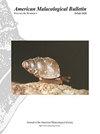淡水雌雄同体钉螺性别角色的影响因素
IF 0.4
4区 生物学
Q4 MARINE & FRESHWATER BIOLOGY
引用次数: 0
摘要
摘要:生殖投资理论认为,女性在择偶方面的投资比男性多,因为卵子的生产成本比精子高。然而,最近的研究表明,初始投资和性选择模式之间的关系更为微妙。同时雌雄同体交配系统为探索生殖投资理论提供了独特的机会,因为个体对捐赠或接受精子和卵子表现出流体偏好。性别角色的转变可能取决于环境或生理条件,如体型。然而,尽管有证据表明温度升高的生理后果会干扰生殖成功,但影响交配角色偏好或行为(如交配潜伏期、互惠性)的环境因素(如温度)尚未得到探讨。通过限制交配过程中可用的能量,温度升高可能会直接影响个人投资,反映在性别角色的变化中。在标准温度(19-20°C)和升高温度(28-29°C)条件下,我们观察了尖绒蝶(Draparnaud 1805)的求偶和性别角色。高温降低了交配的持续时间和频率,但对交配的潜伏期或互惠性没有影响。与之前的研究相反,在两种温度治疗中,性别角色都没有被发现与体型有关。温度处理缺乏对大小的依赖性可能是由于低种群密度或当地气候。综合结果表明,尽管温度升高显然会产生负面的生理后果,但其影响并没有反映在性别角色模式的变化中。这种关系比以前预期的更为复杂,需要进一步研究。本文章由计算机程序翻译,如有差异,请以英文原文为准。
Factors Shaping Gender Role in the Freshwater Hermaphrodite Snail Physella acuta
Abstract: Reproductive investment theory assumes that females invest more in mate choice than males do because eggs are more energetically costly to produce than sperm. However, recent studies indicate that the relationship between initial investment and patterns of sexual selection is more nuanced. Simultaneous hermaphrodite mating systems offer unique opportunities to explore reproductive investment theory, as individuals exhibit fluid preferences for donating or receiving sperm and eggs. Shifts in gender role can depend on environmental or physiological conditions such as size. However, environment factors (e.g. temperature) that affect mating role preference or behavior (e.g. latency to copulate, reciprocity) have not been explored, despite evidence that the physiological consequences of elevated temperature interfere with reproductive success. By constraining the amount of energy available during copulation, elevated temperature may directly impact individual investment, reflected in changes in gender role. We observed courtship and gender roles in Physella acuta (Draparnaud 1805) at standard (19-20°C) and elevated (28-29°C) temperature. Elevated temperature reduced duration and frequency of copulation but had no effect on latency to copulate or reciprocity. Contrary to previous studies, gender role was not found to be size-dependent in either temperature treatment. Lack of size dependence across temperature treatments could be due to low population density or climate in situ. Combined results indicate that although elevated temperature clearly has negative physiological consequences, its impact is not reflected in changes to gender role patterns. This relationship is more complicated than previously expected and requires further study.
求助全文
通过发布文献求助,成功后即可免费获取论文全文。
去求助
来源期刊
CiteScore
1.00
自引率
40.00%
发文量
1
审稿时长
>12 weeks
期刊介绍:
The American Malacological Bulletin serves as an outlet for reporting notable contributions in malacological research. Manuscripts concerning any aspect of original, unpublished research,important short reports, and detailed reviews dealing with molluscs will be considered for publication. Recent issues have included AMS symposia, independent papers, research notes,and book reviews. All published research articles in this journal have undergone rigorous peer review, based on initial editor screening and anonymous reviewing by independent expertreferees. AMS symposium papers have undergone peer review by symposium organizer, symposium participants, and independent referees.

 求助内容:
求助内容: 应助结果提醒方式:
应助结果提醒方式:


